PostTime:11/5/2021
Lasted more than 300 days and nights
Spanning 21 cities in Guangdong Province
As well as Hong Kong and Macau
With more than 6,000 youth entrepreneurship projects
200,000 people participated online
Entries have gone through several selections
…….
On October 15th, the 8th “Jinwan Cup Creating Youth" Innovation and Entrepreneurship Competition of the Guangdong-Hong Kong-Macau Greater Bay Area had successfully concluded in Zhuhai. The team of three students from Guangdong Technion-Israel Institute of Technology won the third prize with the "locust protein extraction" project in the competition, in which the percentage of doctors and high-level talents accounted for more than 30% of the total participants.
After the competition, we interviewed the team leaders Zeng Yuying, Zhang Haoming and Huang Chenwei. Let’s review the five months of competition together and explore the story behind the project.
Combined with the reality, inspired by the class
The shortage of protein resource has been a global issue. The conventional protein intake ways are not enough to cope with the explosive growth of the population in the future. At the same time, insects have many advantages, such as high nutritional value, fast reproduction speed, low production cost, and are suitable for industrial production. They are an excellent source of protein. However, most consumers have a natural fear of eating them, so the insects are hard to be promoted.
The team leaders, Zeng Yuying and Zhang Haoming from Class 2017, were keenly aware of this pain point through the biotechnology entrepreneurship class. With the help of Professor Harold Corke, they improved this thought. They believed that if they could use their professional background in biotechnology and food engineering to extract insect protein, collaborate with corresponding industries, such as health products, food, and even pharmaceuticals, and add insect protein directly to the products, the resistance caused by the appearance of the insect can be easily solved. This approach can maximize the nutritional and commercial value of insects; therefore, the prototype of the project has been decided.
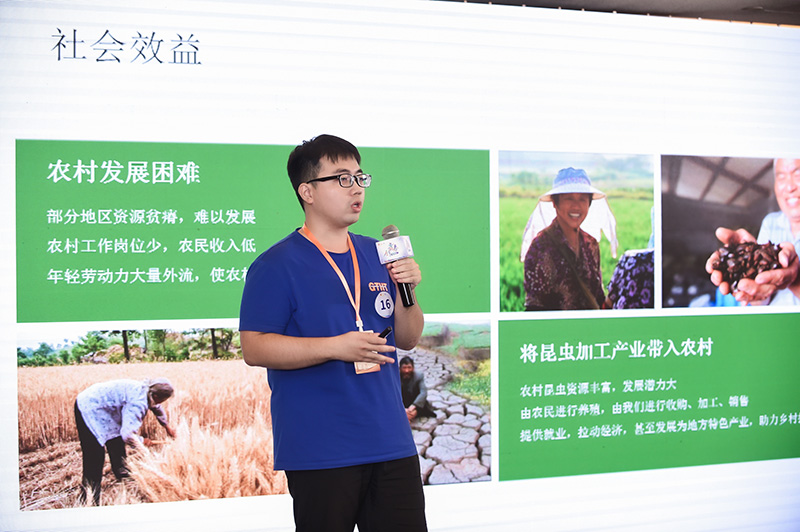
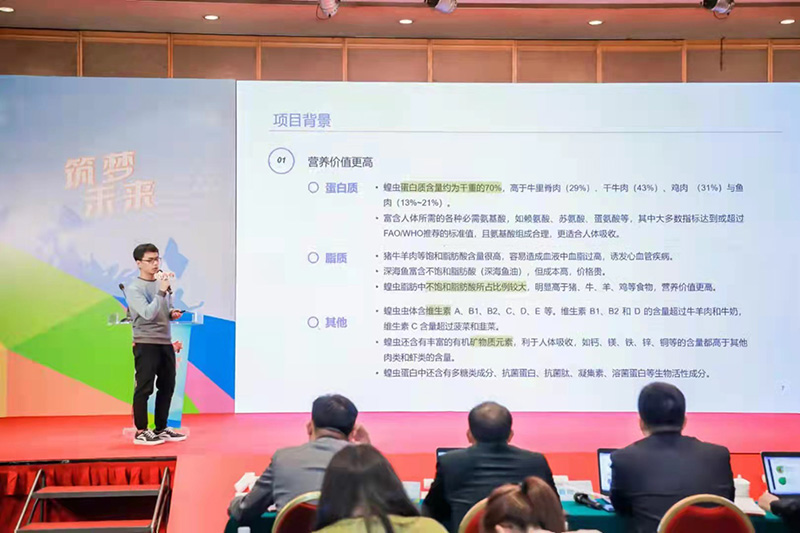
Although a general framework has been set, there are more than 3000 edible insects in the world. Then, how to choose the insects has become a difficult problem for them. After comprehensively considering factors such as the insects’ habits and protein content, they decided to choose locusts, which have up to 70% of protein, as the protein source for the project.
Currently, insect protein extraction mainly relies on alkaline and salt methods, but these will produce toxic substances such as alanine and cause serious environmental problem. Moreover, these two methods have high requirements for the reaction equipment, which is not conducive to industrial production.
After consulting relevant information and asking professors, they decided to use the supercritical fluid carbon dioxide extraction technology, using carbon dioxide instead of traditional organic reagents for extraction. By using this technology, the extracted material does not contain chemical reagents. The extraction efficiency is higher, the cost is lower, and the process is safer.
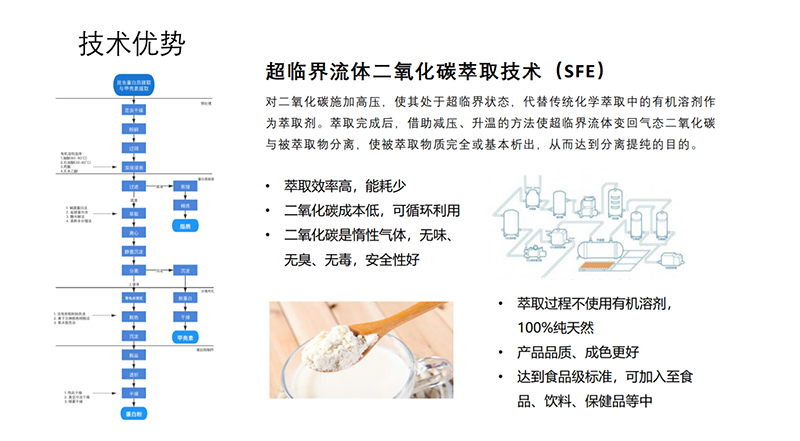
As the project proceeded, Huang Chenwei from Class 2018 was also attracted by the huge prospects of the project. Although they are from the same major, each of them has different knowledge structure, experiences and personal characteristics. Thus, there were some inevitable "small conflicts" in teamwork.
When it comes to how to deal with this problem, the word they mentioned the most is "communication". This kind of "conflict" is the driving force of team progress. Through effective and sincere communications, each team member's strengths can be discovered and used to promote the development of the project in a better direction.
The project instructor, Professor Harold Corke, used his own experience to help the team. During the pricing stage of the project, he keenly discovered that the price of locust protein was too low and it was difficult to achieve a balance between the project's revenue and expenditure. In order to solve this problem, he guided the team to conduct cost accounting and repricing, laying a good foundation for the future commercialization of the project. Professor Yigal Achmon, the tutor of Zeng Yuying, also selflessly shared his experience of participating in the "Guangdong University Scientific Research Achievement Commercialization Roadshow Competition".
In addition to the guidance from the professors of their major, Assistant Professor Kong Bo, the deputy head of Chemical and Engineering Program, also gave great help to the team. "Prof. Kong Bo not only put forward a lot of unique insights of the PPT contents and the details of the competition, but also gave us a lot of relevant knowledge in the preparation of raw materials in a brand new perspective based on his own professional background," Zeng Yuying said. And Dr. Victor Huang, Research Innovation and Gradute Studies, also helped them with presentation skills. With the assistance of these teachers, the team gained a deeper understanding of the global shortage of protein resource and the development status of related industries overseas.
The two team leaders who were busy with their graduation projects sacrificed their rest time and used weekends and holidays to prepare for the competition. The concerted efforts of the team members helped the project to overcome obstacles in the competition and after the strict selections, the project was finally awarded.
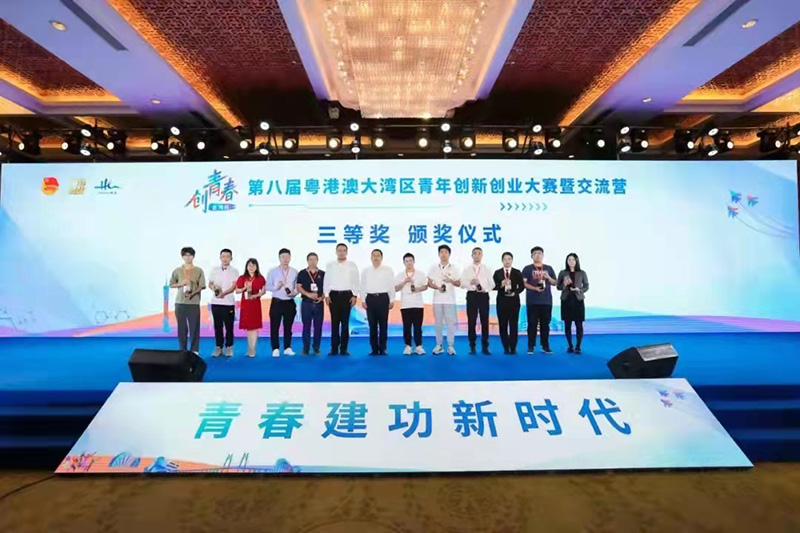
"During the competition, we met many outstanding people and projects in different fields. Our views on agriculture and food began to jump from the perspective of students to professional, and this helped us to see the industry more comprehensively," talking about the reward of the competition, Zeng Yuying concluded. As a young student team, the pressure of competitions promoted their growth.
During the five months, the team members stood on the stage again and again, recommended their projects to unfamiliar experts, and improve their project according to experts’ feedback. From a simple idea to a commercial project, it involves the joint efforts of all aspects. In this process, the team members improved their professional ability, performance ability, as well as their organization and coordination ability. The friendship between each other has become closer.
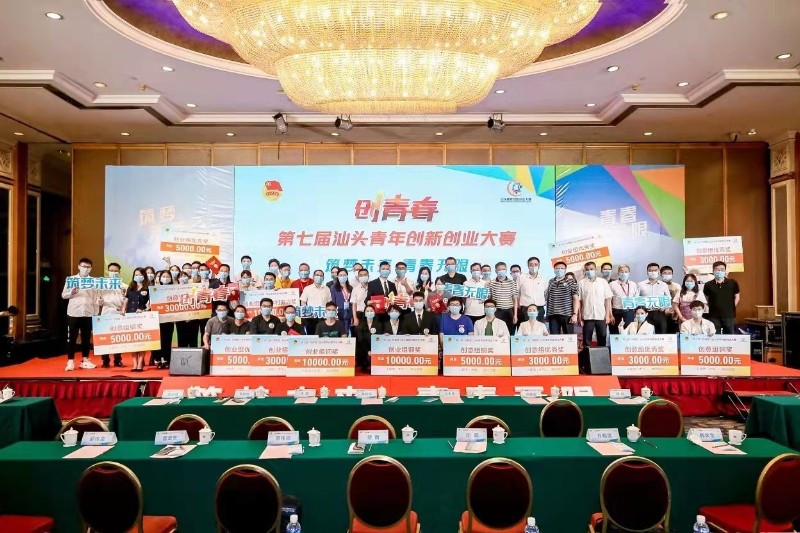
Talking about the future development of the project, the team members said that the project has great commercial value and the possibility of grounding. Although this field is still at an elementary stage in the domestic market, it has shown good potential in foreign markets. There have been successful cases in France and Israel and the extracted protein has a good performance in the animal feed and food fields.
Moreover, in addition to the commercial value, this project also contributes to the rural revitalization. China's rural areas have very rich insect resources. If this industry is promoted in these places, it can drive rural population employment and promote the rapid development of the rural economy.
However, Zeng Yuying also admitted that the project has a relatively high start-up capital and a large scale, which cannot be controlled by their current ability. But the they have never given up on this project. Currently, the two team leaders are studying for their master's degree, and they will continue to work for this direction, improve their technical capabilities, and seek for a better future for the project.
© GUANGDONG TECHNION-ISRAEL INSTITUTE OF TECHNOLOGY | 粤ICP备17036470号
